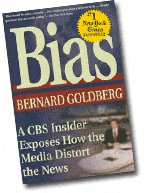 The truth is refreshing. This is much more so in our day and age when it has become fashionable to distort and hide it, or even deny that it exists. Thus, when someone claims to “lay it on the line” and “tell it the way it is,” he invariably draws a following.
The truth is refreshing. This is much more so in our day and age when it has become fashionable to distort and hide it, or even deny that it exists. Thus, when someone claims to “lay it on the line” and “tell it the way it is,” he invariably draws a following.
The unfortunate dark side is that we are so starved for truth, that we often take what seems to be true at face value. Such could be the case with Bernard Goldberg’s new best-selling tell-it-all, Bias: A CBS Insider Exposes How the Media Distort the News.
After all, what conservative can restrain his enthusiasm for a left-leaning media insider blowing the whistle on the liberal indoctrination that passes for unbiased news coverage? This enthusiasm, however, should be tempered with suspicion and vigilance.
Vigilance and suspicion because, although Mr. Goldberg undeniably and effectively exposes the media’s liberal bias, he also retains many liberal premises that color his remarks. We may enthusiastically applaud his tardy wake-up to reality, but we cannot swallow his often vulgar and egalitarian attitudes. Such a trade-off is counterproductive.
A Liberal Agenda or the Existence of Elites?
Mr. Goldberg’s story began in 1996, when CBS ran a program that referred to Steve Forbes’ flat tax promises as “wacky” and called his theory untested, suggesting it should be tried in Albania. When a Southern building contractor named Jerry Kelley complained to him, Mr. Goldberg was struck with a contradiction: if Hillary Clinton’s health care plan had been called “wacky,” it would have created a great stir, while the Forbes’ story was accepted as ethical journalism.
Inspired by the complaint of Mr. Kelley, described as a “chain-smoking, fifty-something year old” cracker, Mr. Goldberg denounced the story in a Wall Street Journal op-ed, unleashing a barrage of liberal complaints against him. Mr. Goldberg becomes the champion of the downtrodden like Mr. Kelley, and the story is transformed into a “Robin-Hoodian” defense of blue-collar America against an oppressive “media elite.” Accordingly, we are told the problem with the media establishment is that it promotes opinions formed at ivy-league schools and is “out of touch” with the average American. As a result, an anti-elite bias pervades the rest of the book.
Of course, Mr. Goldberg confuses two very different concepts: elites and liberals.
Every society has elites which are formed by those with a thirst for excellence. They provide the models and standards that drive the rest of society upwards. Thus, their existence greatly benefits any field. The problem is not the elite ivy-league schools decried by Mr. Goldberg but the liberal agenda that infects higher education in general.
Furthermore, Mr. Goldberg’s “media elite” is more accurately a media establishment made up of executives, editors and reporters bound together not in a social hierarchy, but by long-standing liberal journalistic ideas that reporters must challenge tradition and promote progress and thus foster a hostility or condescendence to all things conservative. Thus while elites can be liberal, not all liberals are elites.
The liberal, on the other hand, defines himself as someone with the right to think, feel and do whatever he desires. He naturally feels restrained by logic, morality or social convention. He tends to favor equality and disfavor elites that insist upon oppressive standards of excellence and quality.
Thus, Mr. Goldberg’s shotgun approach takes aim at a media establishment and hits all elites in the process. His attack on liberalism has unmistakable liberal overtones and his anti-elitist broadside is directed against a “media elite” that is anti-elitist, itself.
Ratings vs. Agenda
This anti-elite bias is compounded with more simplistic reasoning early in the book. The author denies the existence of a liberal agenda, by claiming that money and ratings are the media’s only goals. “Ratings are the God that network executives and their acolytes worship,” he claims.
Admittedly, a superficial reading of the facts could lead to this conclusion. Like the rest of the brutish world of business, the media would seem to crave wealth and fame, holding ideologies only as a means to that end.
Their actions would be explained as merely meeting the demand of their customers. But, a closer look reveals that the media tries to create, rather than meet a demand.
Mr. Goldberg’s book produces the best arguments. He contends that mainstream America is more conservative than the media. He demonstrates how network news shows are rapidly losing viewers, while more conservative alternatives, like Bill O’Reilly and conservative radio talk shows, are gaining them.
If ratings were really the god that network executives and their acolytes worship, the media would undergo a profound shift to the right.
However, the media establishment continues to force feed their biased opinions to the American public. This demonstrates a concerted effort by mainstream media to promote a liberal agenda. Money and ratings may indeed be gods, as long as programming is forcefully restrained within the parameters of that agenda.
The Truth Shall set you Free
In conclusion, the TFP does not recommend Bernard Goldberg’s new book Bias, A CBS Insider Exposes How the Media Distort the News.
Although it undeniably contains useful facts and statistics, it suffers from milder symptoms of the same infectious egalitarianism inspiring liberal media bias. The truth shall set you free and the cure for liberal errors is a truthful reading and acceptance of social hierarchy.
But you will not find it in Mr. Goldberg’s book.

